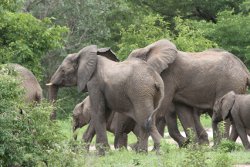Situated in Bauchi State in north-eastern Nigeria, Yankari Game Reserve is the country's richest wildlife oasis and covers a total area of 2,244 km². Yankari contains the largest surviving elephant population in Nigeria, one of the largest remaining in West Africa. Estimated at 100-150 individuals, this population of elephants is perhaps the only viable population remaining in Nigeria. In addition, Yankari Game Reserve also supports an important population of the critically endangered West African lion (one of only four known populations that still survive) as well as buffalo, hippopotamus, roan and hartebeest. Originally created as a game reserve in 1956, Yankari was upgraded to a national park in 1991 and managed by the National Parks Service until 2006 when responsibility for the management of the reserve was handed back to Bauchi State Government. Today Yankari is an important tourism destination in the country, and rapidly growing in popularity.
Conservation Challenges

Management of the reserve has been neglected and under-funded since 2006 when Bauchi State Government took over responsibility for the management of Yankari Game Reserve. As a result, levels of poaching have increased, with emboldened poachers operating even near the tourist camp situated in the centre of the reserve. Unconfirmed reports suggest that large numbers of elephants have been killed in recent years to supply Nigeria’s illegal trade in ivory. In addition, conflict between elephants and local communities living near the boundaries of the reserve as a result of crop damage has reduced levels of community support for the game reserve and encourages local communities to support elephant poachers from outside the region. Poaching of other large mammals to supply the lucrative bushmeat trade also threatens to undermine the ecotourism potential of Yankari by further reducing opportunities for game-viewing by tourists.
Conservation Approach
In 2014 WCS signed an MoU with Bauchi State Government for the co-management of Yankari. The agreement gives WCS full responsibility for the ranger program. Levels of protection have improved significantly since 2014 and levels of hunting and grazing of livestock have been reduced dramatically.
WCS supports SMART-based ranger patrols in Yankari to provide more effective protection of elephants, lions and other wildlife. We do this through intensive ranger training, strict supervision and the provision of field rations, camping allowances, arrest bonuses and essential field equipment. Levels of morale and discipline have improved and opportunities for corruption have been curtailed. These patrols have successfully reduced levels of hunting in Yankari and large mammal populations are now recovering.
SMART is an improved law enforcement monitoring system and a suite of best practices that help protected area managers better monitor, evaluate and adaptively manage patrolling activities. By improving the monitoring of rangers and holding them more accountable, the introduction of CyberTracker in 2009 (replaced by SMART in 2016) helped reduce poaching and other illegal activities in Yankari.
Aerial support. The use of aerial patrols and surveillance to detect illegal activity, and to support and guide law enforcement efforts is invaluable.
Use of GPS/satellite elephant collars to establish real time monitoring of all elephant herds in Yankari, used to direct ranger patrols to those areas frequented by elephants.
Conservation education and raising levels of awareness within the communities surrounding Yankari is essential for its long-term viability. Our new program is focused on providing opportunities for local schoolchildren to visit Yankari, most of whom have never entered the reserve before even though they live right along its boundary.
Goals
Support Bauchi State Government to protect Yankari Game Reserve and its important population of elephants, lion and hippopotamus.